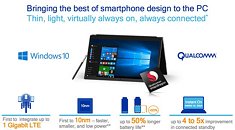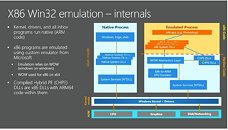- Joined
- Oct 9, 2007
- Messages
- 47,300 (7.53/day)
- Location
- Hyderabad, India
| System Name | RBMK-1000 |
|---|---|
| Processor | AMD Ryzen 7 5700G |
| Motherboard | ASUS ROG Strix B450-E Gaming |
| Cooling | DeepCool Gammax L240 V2 |
| Memory | 2x 8GB G.Skill Sniper X |
| Video Card(s) | Palit GeForce RTX 2080 SUPER GameRock |
| Storage | Western Digital Black NVMe 512GB |
| Display(s) | BenQ 1440p 60 Hz 27-inch |
| Case | Corsair Carbide 100R |
| Audio Device(s) | ASUS SupremeFX S1220A |
| Power Supply | Cooler Master MWE Gold 650W |
| Mouse | ASUS ROG Strix Impact |
| Keyboard | Gamdias Hermes E2 |
| Software | Windows 11 Pro |
Intel rigorously defends its hold over its core intellectual property, the x86 CPU machine-architecture. AMD is the only active licencee of x86, and has a competitive line of processors across market segments. It has been a long-cherished dream of chipmakers without an x86 license to have Microsoft, the world's leading PC operating system manufacturer, somehow emulate their Win32 API, which is inherently designed for the x86 architecture, on the more widely licensed ARM architecture. As one of the largest ARM chipmakers, Qualcomm pushed for 2-in-1 (notebook-to-tablet) convertible PCs driven by its Snapdragon processors, which run Windows 10, complete with support for Win32 software, besides Microsoft's UWP apps.
This Snapdragon + Windows 10 reference convertible is so impressive with its battery life and performance, that major PC OEMs such as Lenovo, HP, and ASUS have lined up to license the design and make their own designs. This would have been a licensable form-factor governed by Microsoft, much like how Intel governed the Ultrabook form-factor. This would hit hard at Intel's bottomline, because SoC makers with big R&D budgets like Qualcomm, Samsung, and NVIDIA, who each hold ARM licenses, could go on to power bigger and faster PCs which emulate x86, driving Intel out of the ecosystem. The company dropped the hammer earlier this week, in a passive-aggressive note without taking names, warning Microsoft and Qualcomm to cease from their efforts to build such a device.


Intel holds over 1,600 patents related to x86, and assured that it welcomes "lawful competition," but will not stand for "unlawful infringement of patents." Key excerpts from a statement released by the company read:
View at TechPowerUp Main Site
This Snapdragon + Windows 10 reference convertible is so impressive with its battery life and performance, that major PC OEMs such as Lenovo, HP, and ASUS have lined up to license the design and make their own designs. This would have been a licensable form-factor governed by Microsoft, much like how Intel governed the Ultrabook form-factor. This would hit hard at Intel's bottomline, because SoC makers with big R&D budgets like Qualcomm, Samsung, and NVIDIA, who each hold ARM licenses, could go on to power bigger and faster PCs which emulate x86, driving Intel out of the ecosystem. The company dropped the hammer earlier this week, in a passive-aggressive note without taking names, warning Microsoft and Qualcomm to cease from their efforts to build such a device.


Intel holds over 1,600 patents related to x86, and assured that it welcomes "lawful competition," but will not stand for "unlawful infringement of patents." Key excerpts from a statement released by the company read:
These are ominous signs that should Qualcomm and Microsoft continue down this path, they will either have to remove Win32 application support from their device, rendering it into a Windows RT-esque potato which only runs UWP apps; or gear up for a long-drawn IP battle between two Fortune 500 companies with billions of dollars in legal budgets.There have been reports that some companies may try to emulate Intel's proprietary x86 ISA without Intel's authorization. Emulation is not a new technology, and Transmeta was notably the last company to claim to have produced a compatible x86 processor using emulation ("code morphing") techniques. Intel enforced patents relating to SIMD instruction set enhancements against Transmeta's x86 implementation even though it used emulation.
Only time will tell if new attempts to emulate Intel's x86 ISA will meet a different fate. Intel welcomes lawful competition, and we are confident that Intel's microprocessors, which have been specifically optimized to implement Intel's x86 ISA for almost four decades, will deliver amazing experiences, consistency across applications, and a full breadth of consumer offerings, full manageability and IT integration for the enterprise. However, we do not welcome unlawful infringement of our patents, and we fully expect other companies to continue to respect Intel's intellectual property rights.
View at TechPowerUp Main Site






